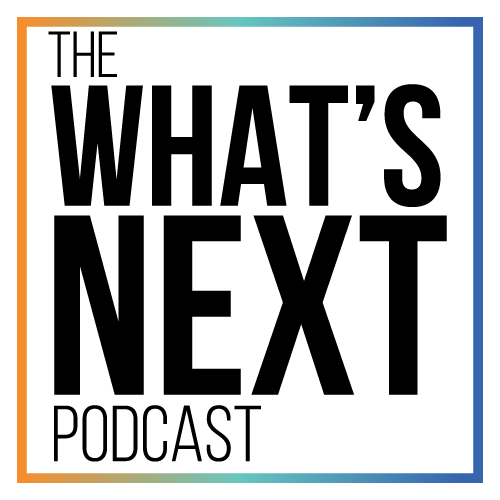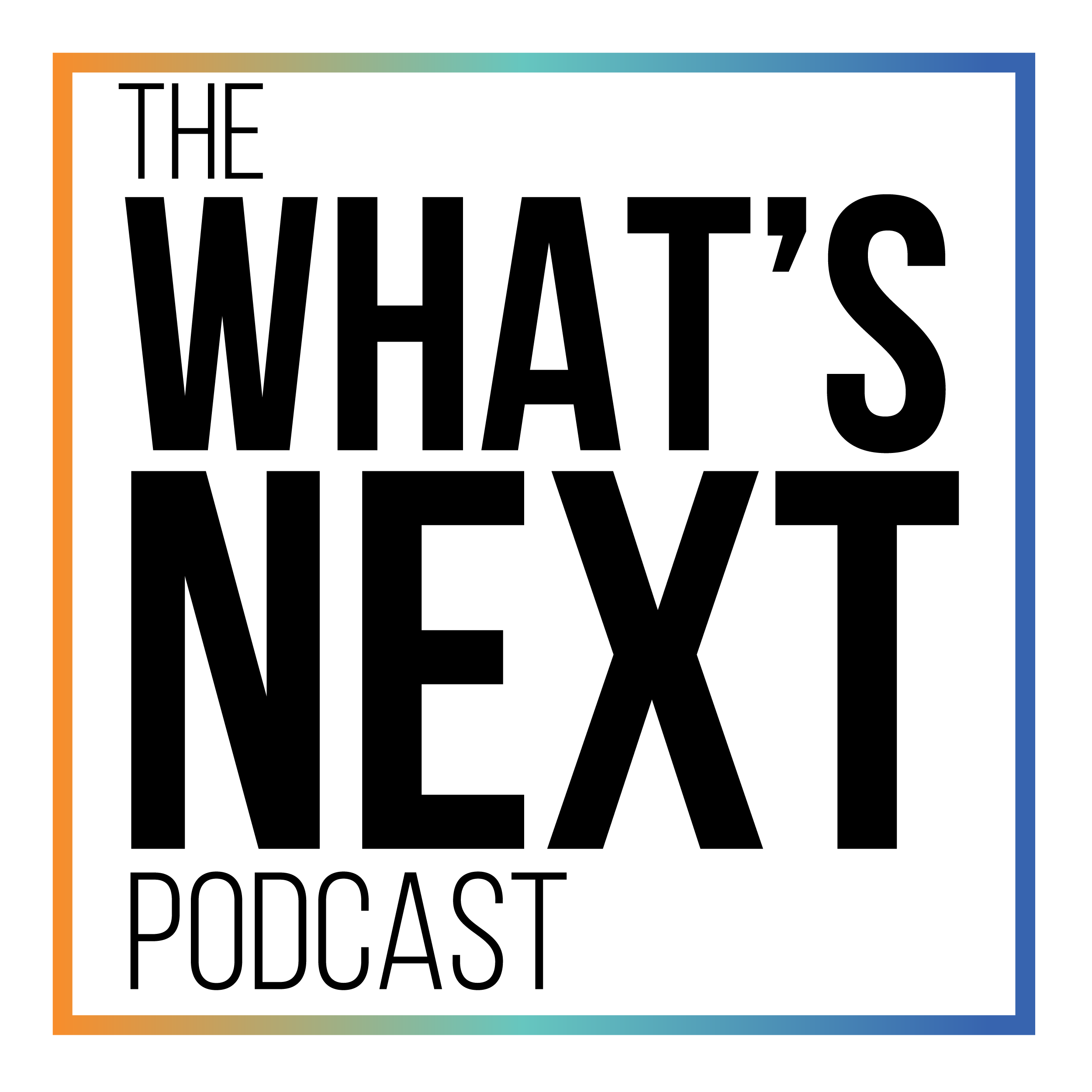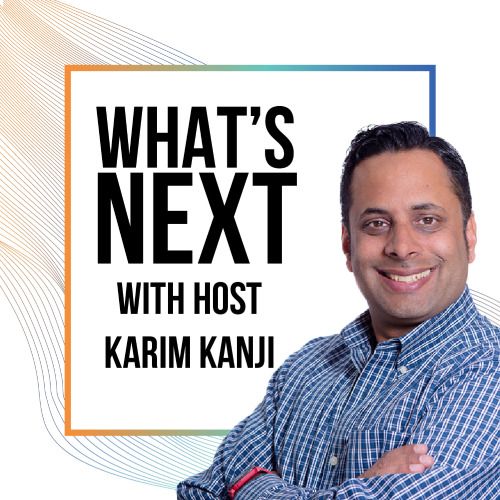Episode 9
What's Next with Kevin Edwards
Undoubtedly one of the most fascinating brands of the past year is Just Eat Takeaway, a British-Dutch dot-com company; in this episode, we enjoyed speaking to Canadian subsidiary company SkipTheDishes CEO Kevin Edwards.
Kevin talks about the lessons learned throughout the pandemic; the effect on their business and independent restaurants.
----------------------------------------------
HISTORY OF JUST EAT TAKEAWAY
Canadian online food delivery company SkipTheDishes was acquired by Just Eat in 2016 for $200M.
The following years saw several mergers and acquisitions across many international markets of scale-up delivery services. By 2020 UK's Just Eat (which had already acquired SkipTheDishes, Menulog, hungryhouse) merged with takeway.com to become Just Eat Takeaway.
In March 2021, Just Eat Takeaway said it expected further growth in orders in 2021 after the pandemic helped drive a sharp rise in revenue for the year.
The food delivery group hailed an "exceptional" 2020 after posting revenue of €2.4bn (£2bn), up 54 per cent from €1.6bn in the previous 12 months. The company reported three consecutive quarters of growth over the year, with overall orders rising 42% to 588m.
---------------------------------------------
ABOUT KEVIN EDWARDS
Kevin was appointed Chief Executive Officer, SkipTheDishes in November 2018 after joining the business in April as Chief Marketing Officer. Proving to be a transformational leader, he was appointed to lead Just Eat’s North American portfolio as Skip entered their next stage of global business growth. With over 30 years of consumer strategy experience, global logistics expertise, and organizational change leadership, Kevin brings a depth of experience to the rapidly-growing business and industry.
Prior to joining Skip, Kevin was the Chief Marketing Officer for the global Movember Foundation, and held the position of Vice President of Marketing for Office Depot in both North America and Europe where he led teams through organisational change, international integration and brand evolvement.
---------------------------------------
FOLLOW US
INSTAGRAM - www.instagram.com/activeintworld
TWITTER - twitter.com/ActiveIntlUK
KARIM - twitter.com/karimkanji
PODCAST WEBSITE - www.thewhatsnextpodcast.com
Transcript
(upbeat music)
Speaker:- [Kevin] Hello, I'm Kevin Edwards,
Speaker:the CEO of Skip TheDishes.
Speaker:- [Karim] Kevin, thank you so much for joining me
Speaker:this morning.
Speaker:- [Kevin] Thank you for having me.
Speaker:Pleasure to be here.
Speaker:- [Karim] Awesome.
Speaker:So let's start off with this question
Speaker:we've all banned for over a year now
Speaker:in some form of a pandemic lockdown across the globe.
Speaker:I'm really curious about the lessons
Speaker:that you and the folks over at Skip TheDishes
Speaker:have learned throughout the pandemic
Speaker:whether it is about your business, your consumers
Speaker:or even people's food habits
Speaker:during the pandemic onboarding,
Speaker:what sort of lessons you've learned throughout this time?
Speaker:- [Kevin] I mean, goodness, there's a lot of lessons.
Speaker:I'm not sure we could cover all of those lessons today
Speaker:but let me just focus on a few things.
Speaker:Look, it is remarkable what a remarkable year
Speaker:it has been.
Speaker:Certainly, so much tragedy
Speaker:and obviously people's lives have been affected
Speaker:and have been taken by the virus,
Speaker:but the effect it's had on small business
Speaker:and in particular restaurants,
Speaker:independent restaurants in particular
Speaker:is what I'm thinking of.
Speaker:When we originally, so it's been about a year.
Speaker:So, it kind of rolled along
Speaker:and the first part of the year
Speaker:and everyone kind of acknowledged there was a degree of risk
Speaker:but then when it, the wave of closures
Speaker:and restrictions and lockdowns that happen so quickly.
Speaker:Back then, I said back then,
Speaker:back in March of last year
Speaker:we had about 200 employees,
Speaker:already employed in Winnipeg, some in Calvary,
Speaker:some in Toronto.
Speaker:We sent everybody home and had everybody functioning
Speaker:and working from home at 72 hours.
Speaker:And so, in order, we knew that,
Speaker:we had a two, so on the Friday
Speaker:that we had this discussion with our leadership team
Speaker:and well, what are we going to do?
Speaker:Not only what are we going to do?
Speaker:What we needed to do was very obvious
Speaker:but how are we going to manage?
Speaker:And, some of the things that we did very, very well
Speaker:where we got our leadership team together very quickly
Speaker:to size the problem.
Speaker:And I mean, an extended leadership team
Speaker:everyone who was responsible for key aspects of the business
Speaker:we got everyone together
Speaker:and we sized the problem.
Speaker:We sort of parsed out the things
Speaker:that needed to be prioritized first, but,
Speaker:within 72 hours, we were
Speaker:we had our entire team working from home.
Speaker:So, all of those team members,
Speaker:and then, more importantly
Speaker:we were able to continue on,
Speaker:like we were managing our shift from home on that,
Speaker:our shift, but we're managing all of our operations shift
Speaker:that night.
Speaker:On Friday night.
Speaker:So, one of the key lessons for me was that
Speaker:the immediacy and getting folks together
Speaker:and problem solving as an entire group
Speaker:was something we did very, very well.
Speaker:We realized early on though, that
Speaker:we haven't, we have two things would happen.
Speaker:One is that we didn't know
Speaker:whether delivery would even be allowed to exist.
Speaker:Food delivery would be allowed to exist
Speaker:in the early going, if you'll recall,
Speaker:thinking about sending a courier
Speaker:from a restaurant to someone's home was
Speaker:it was kind of unknown
Speaker:and it might've been counter-intuitive at the time
Speaker:but the fact is
Speaker:very quickly municipalities mayors.
Speaker:In fact, in this case,
Speaker:Mayor Tory was one of the first to say
Speaker:"Everyone stay at home, order your food in".
Speaker:And the way that we
Speaker:led was we introduced contact less delivery
Speaker:nobody needed to come in contact with anyone.
Speaker:We, so early on as I say,
Speaker:we were uncertain, but we were still managing
Speaker:we're still managing,
Speaker:like we were going to be a viable important to business
Speaker:and that's really what got us through
Speaker:and then thinking about the impact there were
Speaker:that was going to happen for restaurants
Speaker:and how do we support restaurants?
Speaker:And we immediately introduced that,
Speaker:restaurant support package.
Speaker:Getting out in front of what we felt were,
Speaker:sort of this impending doom
Speaker:that was going to occur within the restaurant business
Speaker:and we've been,
Speaker:we're proud to say we're leaders of that.
Speaker:It was a difficult conversation at the beginning
Speaker:when all of a sudden you may put yourself in a position
Speaker:of being unprofitable for a long period of time.
Speaker:We didn't know how long this was going to last
Speaker:and so, I mean, there's lots of lessons there.
Speaker:There's lots of lessons
Speaker:and I think we as a leadership team
Speaker:did a good job of navigating where
Speaker:there was really no map at the time.
Speaker:- [Karim] That is so true.
Speaker:I want to flip to a different discussion
Speaker:around global market differences
Speaker:Skip TheDishes, Canadian brand
Speaker:part of a larger organization of food delivery globally.
Speaker:I'm really interested if we're seeing,
Speaker:if you know of any cultural differences
Speaker:as it pertains to food delivery across the globe
Speaker:and how it might be different in North America
Speaker:versus Europe, versus Asia.
Speaker:- [Kevin] Yeah, a great question.
Speaker:There are fundamental differences.
Speaker:So, there are two delivery,
Speaker:food delivery exists in two ways.
Speaker:There is what we call marketplace.
Speaker:So there are the,
Speaker:there are restaurants that traditionally self deliver.
Speaker:In particular, if you think about North America
Speaker:in a market like New York restaurants deliver,
Speaker:they deliver in a very,
Speaker:sort of tight radius around their around their location,
Speaker:but they deliver.
Speaker:So, marketplaces when you have,
Speaker:brands locally independence, restaurants on a platform
Speaker:and you are essentially, marketing on behalf
Speaker:of you're promoting your brand as a destination
Speaker:for people to come and select from restaurants
Speaker:and then sending them the orders
Speaker:and they execute delivery.
Speaker:Then there is logistics, the logistics side of the business
Speaker:which is what Skip is engaged in.
Speaker:I mean, we also provide orders.
Speaker:We provide marketplace in Canada, but it,
Speaker:the segment in Canada's very small
Speaker:but in Europe, marketplace was, I mean
Speaker:we're our parent company is Just Eat
Speaker:and now Takeaway,
Speaker:and marketplace was the vast majority of business in Europe
Speaker:and, for a long time in London as well.
Speaker:Now of course, logistics is becoming more
Speaker:and more important, and it will soon ultimately
Speaker:become the predominant part of the business.
Speaker:So, there are fundamental differences
Speaker:and just in two ways of executing an order,
Speaker:we are as I say, we are a logistics business
Speaker:who also was able to facilitate what takeout
Speaker:and self delivery but predominantly
Speaker:we are a logistics business.
Speaker:So, our job is to handle everything from
Speaker:bringing people to the app
Speaker:to select from independent restaurants.
Speaker:So chains, national brands and taking payment
Speaker:featuring their products, managing the process,
Speaker:taking the payments, sending the order,
Speaker:sending the courier
Speaker:and ensuring that ultimately delivery occurs
Speaker:in satisfaction is gained.
Speaker:- [Karim] I was going to save this question for last,
Speaker:but, I'm last, but I'm going to ask this now.
Speaker:You talk about Skip TheDishes being a logistics business.
Speaker:So I'm really curious
Speaker:what's next for Skip, public facing
Speaker:we all see it as a food delivery app.
Speaker:I'm really curious whether there's more for Skip
Speaker:based on the logistics work that you guys do
Speaker:based on the transportation
Speaker:and the technology that is underlying all of this,
Speaker:what the future for Skip is.
Speaker:- [Karim] So to be clear,
Speaker:we're a logistics business,
Speaker:but as we're a technology enabled logistics business
Speaker:at the core of what we do is I mean
Speaker:we are a brand, right?
Speaker:We are attracting customers to our platform,
Speaker:both through our marketing
Speaker:and our assortment
Speaker:and the quality of our service
Speaker:when taking an order, executing it
Speaker:and ensuring that, satisfactory delivery occurs.
Speaker:But we are also an on demand delivery service.
Speaker:So we, we're not looking to pivot
Speaker:and begin to, deliver all products across all categories
Speaker:and verticals.
Speaker:We are, if the business
Speaker:or the opportunity is around on demand
Speaker:that then very naturally, we could play a role
Speaker:in providing service to those categories
Speaker:for instance, convenience 7-Eleven is one of our partners,
Speaker:we're through the pandemic we've become
Speaker:a very important part of their business
Speaker:and so convenience, specialty grocery, alcohol,
Speaker:there are places that we as a brand can look to
Speaker:and where an on-demand delivery service
Speaker:would make sense and be viable.
Speaker:- [Karim] And one thinks here in Canada
Speaker:of technology companies and where they're based
Speaker:I don't know whether Winnipeg would be in the top five
Speaker:or even in the top 10,
Speaker:but Skip TheDishes is a tech company based in Winnipeg.
Speaker:I'm interested in the approach
Speaker:that Skip has taken in attracting talent
Speaker:and with everybody working from home
Speaker:is there going to be a shift
Speaker:post pandemic in terms of people
Speaker:being close to and around the Winnipeg area?
Speaker:- [Kevin] Yeah, good.
Speaker:Another good question.
Speaker:Look, all our team is working from home and has worked
Speaker:from home for the past year, but that's not ideal.
Speaker:I will be perfectly honest with you.
Speaker:We have a brand new head office
Speaker:that we built in the,
Speaker:in Winnipeg we have an office in Toronto,
Speaker:we have an office in Calgary.
Speaker:What keeps me up at night
Speaker:and many of our leaders is
Speaker:what is not happening?
Speaker:What are we missing?
Speaker:As people spend their days on video calls
Speaker:and have conversations over the phone
Speaker:because look innovation, creativity
Speaker:occurs face-to-face, it's biblical to have
Speaker:a water cooler conversation,
Speaker:or, let's go over it lunch.
Speaker:Can I go get you a coffee?
Speaker:Let's walk down the hall, let me drop by your desk
Speaker:you can't do that in video.
Speaker:So, and I say, what keeps me up at night is
Speaker:we don't know what we're not creating
Speaker:we don't know what's not being
Speaker:innovative there or what innovation is not occurring.
Speaker:You just don't know, right?
Speaker:You don't know what you don't know,
Speaker:but it's safe to say
Speaker:like our business would not have been created over video
Speaker:and so at some point we've got to bring people together
Speaker:and there will be a high degree of flexibility that
Speaker:I mean, we can't go from zero to 60 overnight,
Speaker:but there will, there'll be,
Speaker:there will be a degree of flexibility.
Speaker:Also location is become, a conversation
Speaker:but we have, we have more than 3000 employees in Winnipeg
Speaker:we have an operations team that is all
Speaker:in sourced in Winnipeg, our marketing, our engineers
Speaker:for the vast majority of our team.
Speaker:They are located in Winnipeg.
Speaker:Three years ago Winnipeg was not a destination,
Speaker:but I can tell you in the last three years,
Speaker:as Skip has emerged as a brand and tech,
Speaker:other tech businesses have been built in Winnipeg,
Speaker:it is not off the radar anymore.
Speaker:It is a fabulous city the talent that is there is remarkable
Speaker:and dedicated and loyal.
Speaker:Skip wouldn't be where it is today if we,
Speaker:I believe if we were built any place else
Speaker:there's just a degree of sticktuitiveness
Speaker:and head down and passion
Speaker:that we found in the talent
Speaker:that we've brought on board and Winnipeg.
Speaker:Now, there was a point at which Winnipeg
Speaker:is a city of less than 800,000 people.
Speaker:There's a point at which you need to look beyond Winnipeg
Speaker:when you're at 3,200 3,300 employees
Speaker:we may be getting to the point where,
Speaker:and we are getting to the point
Speaker:willing to look beyond when it paid
Speaker:but not at the risk of shifting
Speaker:the core teams out of Winnipeg
Speaker:and look, if you were to say to somebody
Speaker:three years ago, do you want to move to Winnipeg
Speaker:and work for this brand?
Speaker:Maybe not three years, maybe four years ago
Speaker:and work and worked for a Skip TheDishes
Speaker:most people would say, first of all, no
Speaker:and secondly what's Skip TheDishes?
Speaker:We have definitely emerged
Speaker:and we're very proud of the fact that we've emerged
Speaker:as a prominent brand in Canada.
Speaker:We're number one in our category we are a roughly 50% share
Speaker:of the Canadian food delivery business
Speaker:and we've become a destination for people.
Speaker:They want to come work for us
Speaker:they obviously see our, the,
Speaker:our efforts around marketing
Speaker:and in brand but also the opportunities that it creates
Speaker:because we have a fantastic platform
Speaker:and a group of incredibly talented engineers.
Speaker:- [Karim] Perfect Kevin, thank you so much
Speaker:for joining us this morning
Speaker:I really appreciated this conversation.
Speaker:- [Kevin] You're you're very welcome, thank you.
Speaker:- [Narrator] Power your advertising.
Speaker:Working with Active International
Speaker:enables you to fund your advertising.
Speaker:Using your company's own products, assets, or even services.
Speaker:We have over 30 years experience connecting
Speaker:and bringing value to businesses all over the globe
Speaker:helping many brands scale up into household names.
Speaker:Want to achieve more from your marketing spans


